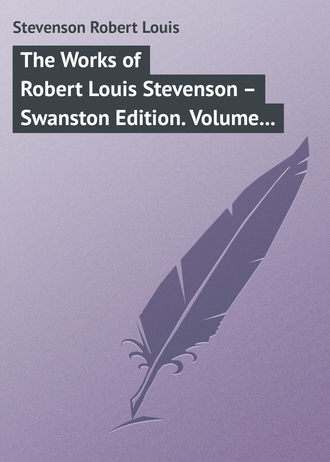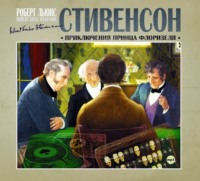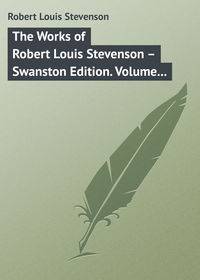 полная версия
полная версияThe Works of Robert Louis Stevenson – Swanston Edition. Volume 7
“O, Finsbury,” said he, not without embarrassment, “it’s of course only fair to let you know – the fact is, money is a trifle tight – I have some paper out – for that matter, every one’s complaining – and in short – ”
“It has never been our habit, Rodgerson,” said Morris, turning pale. “But give me time to turn round, and I’ll see what I can do; I daresay we can let you have something to account.”
“Well, that’s just where it is,” replied Rodgerson. “I was tempted; I’ve let the credit out of my hands.”
“Out of your hands?” repeated Morris. “That’s playing rather fast and loose with us, Mr. Rodgerson.”
“Well, I got cent. for cent. for it,” said the other, “on the nail, in a certified cheque.”
“Cent. for cent.!” cried Morris. “Why, that’s something like thirty per cent. bonus; a singular thing! Who’s the party?”
“Don’t know the man,” was the reply. “Name of Moss.”
“A Jew,” Morris reflected, when his visitor was gone. And what could a Jew want with a claim of – he verified the amount in the books – a claim of three five eight, nineteen, ten, against the house of Finsbury? And why should he pay cent. for cent.? The figure proved the loyalty of Rodgerson – even Morris admitted that. But it proved unfortunately something else – the eagerness of Moss. The claim must have been wanted instantly, for that day, for that morning even. Why? The mystery of Moss promised to be a fit pendant to the mystery of Pitman.
“And just when all was looking well too!” cried Morris, smiting his hand upon the desk. And almost at the same moment Mr. Moss was announced.
Mr. Moss was a radiant Hebrew, brutally handsome, and offensively polite. He was acting, it appeared, for a third party; he understood nothing of the circumstances; his client desired to have his position regularised; but he would accept an antedated cheque – antedated by two months, if Mr. Finsbury chose.
“But I don’t understand this,” said Morris. “What made you pay cent. per cent. for it to-day?”
Mr. Moss had no idea; only his orders.
“The whole thing is thoroughly irregular,” said Morris. “It is not the custom of the trade to settle at this time of the year. What are your instructions if I refuse?”
“I am to see Mr. Joseph Finsbury, the head of the firm,” said Mr. Moss. “I was directed to insist on that; it was implied you had no status here – the expressions are not mine.”
“You cannot see Mr. Joseph; he is unwell,” said Morris.
“In that case I was to place the matter in the hands of a lawyer. Let me see,” said Mr. Moss, opening a pocket-book with, perhaps, suspicious care, at the right place – “Yes – of Mr. Michael Finsbury. A relation, perhaps? In that case, I presume, the matter will be pleasantly arranged.”
To pass into the hands of Michael was too much for Morris. He struck his colours. A cheque at two months was nothing, after all. In two months he would probably be dead, or in a gaol at any rate. He bade the manager give Mr. Moss a chair and the paper. “I’m going over to get a cheque signed by Mr. Finsbury,” said he, “who is lying ill at John Street.”
A cab there and a cab back; here were inroads on his wretched capital! He counted the cost; when he was done with Mr. Moss he would be left with twelvepence-halfpenny in the world. What was even worse, he had now been forced to bring his uncle up to Bloomsbury. “No use for poor Johnny in Hampshire now,” he reflected. “And how the farce is to be kept up completely passes me. At Browndean it was just possible; in Bloomsbury it seems beyond human ingenuity – though I suppose it’s what Michael does. But then he has accomplices – that Scotsman and the whole gang. Ah, if I had accomplices!”
Necessity is the mother of the arts. Under a spur so immediate, Morris surprised himself by the neatness and despatch of his new forgery, and within three-fourths of an hour had handed it to Mr. Moss.
“That is very satisfactory,” observed that gentleman, rising. “I was to tell you it will not be presented, but you had better take care.”
The room swam round Morris. “What – what’s that!” he cried, grasping the table. He was miserably conscious the next moment of his shrill tongue and ashen face. “What do you mean – it will not be presented? Why am I to take care? What is all this mummery?”
“I have no idea, Mr. Finsbury,” replied the smiling Hebrew. “It was a message I was to deliver. The expressions were put into my mouth.”
“What is your client’s name?” asked Morris.
“That is a secret for the moment,” answered Mr. Moss.
Morris bent toward him. “It’s not the bank?” he asked hoarsely.
“I have no authority to say more, Mr. Finsbury,” returned Mr. Moss. “I will wish you a good morning, if you please.”
“Wish me a good morning!” thought Morris; and the next moment, seizing his hat, he fled from his place of business like a madman. Three streets away he stopped and groaned. “Lord! I should have borrowed from the manager!” he cried. “But it’s too late now; it would look dicky to go back; I’m penniless – simply penniless – like the unemployed.”
He went home and sat in the dismantled dining-room with his head in his hands. Newton never thought harder than this victim of circumstances, and yet no clearness came. “It may be a defect in my intelligence,” he cried, rising to his feet, “but I cannot see that I am fairly used. The bad luck I’ve had is a thing to write to the Times about; it’s enough to breed a revolution. And the plain English of the whole thing is that I must have money at once. I’m done with all morality now; I’m long past that stage; money I must have, and the only chance I see is Bent Pitman. Bent Pitman is a criminal, and therefore his position’s weak. He must have some of that eight hundred left; if he has I’ll force him to go shares; and even if he hasn’t, I’ll tell him the tontine affair, and with a desperate man like Pitman at my back, it’ll be strange if I don’t succeed.”
Well and good. But how to lay hands upon Bent Pitman, except by advertisement, was not so clear. And even so, in what terms to ask a meeting? on what grounds? and where? Not at John Street, for it would never do to let a man like Bent Pitman know your real address; nor yet at Pitman’s house, some dreadful place in Holloway, with a trap-door in the back kitchen; a house which you might enter in a light summer overcoat and varnished boots, to come forth again piecemeal in a market-basket. That was the drawback of a really efficient accomplice, Morris felt, not without a shudder. “I never dreamed I should come to actually covet such society,” he thought. And then a brilliant idea struck him. Waterloo Station, a public place, yet at certain hours of the day a solitary; a place, besides, the very name of which must knock upon the heart of Pitman, and at once suggest a knowledge of the latest of his guilty secrets. Morris took a piece of paper and sketched his advertisement.
“William Bent Pitman, if this should meet the eye of, he will hear of SOMETHING TO HIS ADVANTAGE on the far end of the main line departure platform, Waterloo Station, 2 to 4 P.M., Sunday next.”
Morris reperused this literary trifle with approbation. “Terse,” he reflected. “Something to his advantage is not strictly true; but it’s taking and original, and a man is not on oath in an advertisement. All that I require now is the ready cash for my own meals and for the advertisement, and – no, I can’t lavish money upon John, but I’ll give him some more papers. How to raise the wind?”
He approached his cabinet of signets, and the collector suddenly revolted in his blood. “I will not!” he cried; “nothing shall induce me to massacre my collection – rather theft!” And dashing upstairs to the drawing-room, he helped himself to a few of his uncle’s curiosities: a pair of Turkish babooshes, a Smyrna fan, a water-cooler, a musket guaranteed to have been seized from an Ephesian bandit, and a pocketful of curious but incomplete sea-shells.
CHAPTER XIV
WILLIAM BENT PITMAN HEARS OF SOMETHING TO HIS ADVANTAGE
On the morning of Sunday, William Dent Pitman rose at his usual hour, although with something more than the usual reluctance. The day before (it should be explained) an addition had been made to his family in the person of a lodger. Michael Finsbury had acted sponsor in the business, and guaranteed the weekly bill; on the other hand, no doubt with a spice of his prevailing jocularity, he had drawn a depressing portrait of the lodger’s character. Mr. Pitman had been led to understand his guest was not good company; he had approached the gentleman with fear, and had rejoiced to find himself the entertainer of an angel. At tea he had been vastly pleased; till hard on one in the morning he had sat entranced by eloquence and progressively fortified with information in the studio; and now, as he reviewed over his toilet the harmless pleasures of the evening, the future smiled upon him with revived attractions. “Mr. Finsbury is indeed an acquisition,” he remarked to himself; and as he entered the little parlour, where the table was already laid for breakfast, the cordiality of his greeting would have befitted an acquaintanceship already old.
“I am delighted to see you, sir” – these were his expressions – “and I trust you have slept well.”
“Accustomed as I have been for so long to a life of almost perpetual change,” replied the guest, “the disturbance so often complained of by the more sedentary, as attending their first night in (what is called) a new bed, is a complaint from which I am entirely free.”
“I am delighted to hear it,” said the drawing-master warmly. “But I see I have interrupted you over the paper.”
“The Sunday paper is one of the features of the age,” said Mr. Finsbury. “In America, I am told, it supersedes all other literature, the bone and sinew of the nation finding their requirements catered for; hundreds of columns will be occupied with interesting details of the world’s doings, such as water-spouts, elopements, conflagrations, and public entertainments; there is a corner for politics, ladies’ work, chess, religion, and even literature; and a few spicy editorials serve to direct the course of public thought. It is difficult to estimate the part played by such enormous and miscellaneous repositories in the education of the people. But this (though interesting in itself) partakes of the nature of a digression; and what I was about to ask you was this: Are you yourself a student of the daily press?”
“There is not much in the papers to interest an artist,” returned Pitman.
“In that case,” resumed Joseph, “an advertisement which has appeared the last two days in various journals, and reappears this morning, may possibly have failed to catch your eye. The name, with a trifling variation, bears a strong resemblance to your own. Ah, here it is. If you please, I will read it to you: —
“’William Bent Pitman, if this should meet the eye of, he will hear of SOMETHING TO HIS ADVANTAGE at the far end of the main line departure platform, Waterloo Station, 2 to 4 P.M. to-day.’”
“Is that in print?” cried Pitman. “Let me see it! Bent? It must be Dent! Something to my advantage? Mr. Finsbury, excuse me offering a word of caution; I am aware how strangely this must sound in your ears, but there are domestic reasons why this little circumstance might perhaps be better kept between ourselves. Mrs. Pitman – my dear sir, I assure you there is nothing dishonourable in my secrecy; the reasons are domestic, merely domestic; and I may set your conscience at rest when I assure you all the circumstances are known to our common friend, your excellent nephew, Mr. Michael, who has not withdrawn from me his esteem.”
“A word is enough, Mr. Pitman,” said Joseph, with one of his Oriental reverences.
Half an hour later, the drawing-master found Michael in bed and reading a book, the picture of good-humour and repose.
“Hillo, Pitman,” he said, laying down his book, “what brings you here at this inclement hour? Ought to be in church, my boy!”
“I have little thought of church to-day, Mr. Finsbury,” said the drawing-master. “I am on the brink of something new, sir.” And he presented the advertisement.
“Why, what is this?” cried Michael, sitting suddenly up. He studied it for half a minute with a frown. “Pitman, I don’t care about this document a particle,” said he.
“It will have to be attended to, however,” said Pitman.
“I thought you’d had enough of Waterloo,” returned the lawyer. “Have you started a morbid craving? You’ve never been yourself anyway since you lost that beard. I believe now it was where you kept your senses.”
“Mr. Finsbury,” said the drawing-master, “I have tried to reason this matter but, and, with your permission, I should like to lay before you the results.”
“Fire away,” said Michael; “but please, Pitman, remember it’s Sunday, and let’s have no bad language.”
“There are three views open to us,” began Pitman. “First this may be connected with the barrel; second, it may be connected with Mr. Semitopolis’s statue; and third, it may be from my wife’s brother, who went to Australia. In the first case, which is of course possible, I confess the matter would be best allowed to drop.”
“The court is with you there, Brother Pitman,” said Michael.
“In the second,” continued the other, “it is plainly my duty to leave no stone unturned for the recovery of the lost antique.”
“My dear fellow, Semitopolis has come down like a trump; he has pocketed the loss and left you the profit. What more would you have?” inquired the lawyer.
“I conceive, sir, under correction, that Mr. Semitopolis’s generosity binds me to even greater exertion,” said the drawing-master. “The whole business was unfortunate; it was – I need not disguise it from you – it was illegal from the first: the more reason that I should try to behave like a gentleman,” concluded Pitman, flushing.
“I have nothing to say to that,” returned the lawyer. “I have sometimes thought I should like to try to behave like a gentleman myself; only it’s such a one-sided business, with the world and the legal profession as they are.”
“Then, in the third,” resumed the drawing-master, “if it’s Uncle Tim, of course, our fortune’s made.”
“It’s not Uncle Tim, though,” said the lawyer.
“Have you observed that very remarkable expression: Something to his advantage?” inquired Pitman shrewdly.
“You innocent mutton,” said Michael, “it’s the seediest commonplace in the English language, and only proves the advertiser is an ass. Let me demolish your house of cards for you at once. Would Uncle Tim make that blunder in your name? – in itself, the blunder is delicious, a huge improvement on the gross reality, and I mean to adopt it in the future; but is it like Uncle Tim?”
“No, it’s not like him,” Pitman admitted. “But his mind may have become unhinged at Ballarat.”
“If you come to that, Pitman,” said Michael, “the advertiser may be Queen Victoria, fired with the desire to make a duke of you. I put it to yourself if that’s probable; and yet it’s not against the laws of nature. But we sit here to consider probabilities; and with your genteel permission, I eliminate her Majesty and Uncle Tim on the threshold. To proceed, we have your second idea, that this has some connection with the statue. Possible; but in that case who is the advertiser? Not Ricardi, for he knows your address; not the person who got the box, for he doesn’t know your name. The vanman, I hear you suggest, in a lucid interval. He might have got your name, and got it incorrectly, at the station; and he might have failed to get your address. I grant the vanman. But a question: Do you really wish to meet the vanman?”
“Why should I not?” asked Pitman.
“If he wants to meet you,” replied Michael, “observe this: it is because he has found his address-book, has been to the house that got the statue, and – mark my words! – is moving at the instigation of the murderer.”
“I should be very sorry to think so,” said Pitman; “but I still consider it my duty to Mr. Semitopolis…”
“Pitman,” interrupted Michael, “this will not do. Don’t seek to impose on your legal adviser; don’t try to pass yourself off for the Duke of Wellington, for that is not your line. Come, I wager a dinner I can read your thoughts. You still believe it’s Uncle Tim.”
“Mr. Finsbury,” said the drawing-master, colouring, “you are not a man in narrow circumstances, and you have no family. Guendolen is growing up, a very promising girl – she was confirmed this year; and I think you will be able to enter into my feelings as a parent when I tell you she is quite ignorant of dancing. The boys are at the board school, which is all very well in its way; at least, I am the last man in the world to criticise the institutions of my native land. But I had fondly hoped that Harold might become a professional musician; and little Otho shows a quite remarkable vocation for the Church. I am not exactly an ambitious man…”
“Well, well,” interrupted Michael. “Be explicit; you think it’s Uncle Tim?”
“It might be Uncle Tim,” insisted Pitman, “and if it were, and I neglected the occasion, how could I ever look my children in the face? I do not refer to Mrs. Pitman…”
“No, you never do,” said Michael.
“… but in the case of her own brother returning from Ballarat …” continued Pitman.
“… with his mind unhinged,” put in the lawyer.
“… returning from Ballarat with a large fortune, her impatience may be more easily imagined than described,” concluded Pitman.
“All right,” said Michael, “be it so. And what do you propose to do?”
“I am going to Waterloo,” said Pitman, “in disguise.”
“All by your little self?” inquired the lawyer. “Well, I hope you think it safe. Mind and send me word from the police cells.”
“O, Mr. Finsbury, I had ventured to hope – perhaps you might be induced to – to make one of us,” faltered Pitman.
“Disguise myself on Sunday?” cried Michael. “How little you understand my principles!”
“Mr. Finsbury, I have no means of showing you my gratitude; but let me ask you one question,” said Pitman. “If I were a very rich client, would you not take the risk?”
“Diamond, Diamond, you know not what you do!” cried Michael. “Why, man, do you suppose I make a practice of cutting about London with my clients in disguise? Do you suppose money would induce me to touch this business with a stick? I give you my word of honour, it would not. But I own I have a real curiosity to see how you conduct this interview – that tempts me; it tempts me, Pitman, more than gold – it should be exquisitely rich.” And suddenly Michael laughed. “Well, Pitman,” said he, “have all the truck ready in the studio. I’ll go.”
About twenty minutes after two, on this eventful day, the vast and gloomy shed of Waterloo lay, like the temple of a dead religion, silent and deserted. Here and there at one of the platforms, a train lay becalmed; here and there a wandering footfall echoed; the cab-horses outside stamped with startling reverberations on the stones; or from the neighbouring wilderness of railway an engine snorted forth a whistle. The main-line departure platform slumbered like the rest; the booking-hutches closed; the backs of Mr. Haggard’s novels, with which upon a weekday the bookstall shines emblazoned, discreetly hidden behind dingy shutters; the rare officials, undisguisedly somnambulant; and the customary loiterers, even to the middle-aged woman with the ulster and the handbag, fled to more congenial scenes. As in the inmost dells of some small tropic island the throbbing of the ocean lingers, so here a faint pervading hum and trepidation told in every corner of surrounding London.
At the hour already named, persons acquainted with John Dickson, of Ballarat, and Ezra Thomas, of the United States of America, would have been cheered to behold them enter through the booking-office.
“What names are we to take?” inquired the latter, anxiously adjusting the window-glass spectacles which he had been suffered on this occasion to assume.
“There’s no choice for you, my boy,” returned Michael. “Bent Pitman or nothing. As for me, I think I look as if I might be called Appleby; something agreeably old-world about Appleby – breathes of Devonshire cider. Talking of which, suppose you wet your whistle? the interview is likely to be trying.”
“I think I’ll wait till afterwards,” returned Pitman; “on the whole, I think I’ll wait till the thing’s over. I don’t know if it strikes you as it does me; but the place seems deserted and silent, Mr. Finsbury, and filled with very singular echoes.”
“Kind of Jack-in-the-box feeling?” inquired Michael, “as if all these empty trains might be filled with policemen waiting for a signal? and Sir Charles Warren perched among the girders with a silver whistle to his lips? It’s guilt, Pitman.”
In this uneasy frame of mind they walked nearly the whole length of the departure platform, and at the western extremity became aware of a slender figure standing back against a pillar. The figure was plainly sunk into a deep abstraction; he was not aware of their approach, but gazed far abroad over the sunlit station. Michael stopped.
“Holloa!” said he, “can that be your advertiser? If so, I’m done with it.” And then, on second thoughts: “Not so, either,” he resumed more cheerfully. “Here, turn your back a moment. So. Give me the specs.”
“But you agreed I was to have them,” protested Pitman.
“Ah, but that man knows me,” said Michael.
“Does he? what’s his name?” cried Pitman.
“O, he took me into his confidence,” returned the lawyer. “But I may say one thing: if he’s your advertiser (and he may be, for he seems to have been seized with criminal lunacy) you can go ahead with a clear conscience, for I hold him in the hollow of my hand.”
The change effected, and Pitman comforted with this good news, the pair drew near to Morris.
“Are you looking for Mr. William Bent Pitman?” inquired the drawing-master. “I am he.”
Morris raised his head. He saw before him, in the speaker, a person of almost indescribable insignificance, in white spats and a shirt cut indecently low. A little behind, a second and more burly figure offered little to criticism, except ulster, whiskers, spectacles, and deer-stalker hat. Since he had decided to call up devils from the underworld of London, Morris had pondered deeply on the probabilities of their appearance. His first emotion, like that of Charoba when she beheld the sea, was one of disappointment; his second did more justice to the case. Never before had he seen a couple dressed like these; he had struck a new stratum.
“I must speak with you alone,” said he.
“You need not mind Mr. Appleby,” returned Pitman. “He knows all.”
“All? Do you know what I am here to speak of?” inquired Morris. “The barrel.”
Pitman turned pale, but it was with manly indignation. “You are the man!” he cried. “You very wicked person.”
“Am I to speak before him?” asked Morris, disregarding these severe expressions.
“He has been present throughout,” said Pitman. “He opened the barrel; your guilty secret is already known to him, as well as to your Maker and myself.”
“Well, then,” said Morris, “what have you done with the money?”
“I know nothing about any money,” said Pitman.
“You needn’t try that on,” said Morris. “I have tracked you down; you came to the station sacrilegiously disguised as a clergyman, procured my barrel, opened it, rifled the body, and cashed the bill. I have been to the bank, I tell you! I have followed you step by step, and your denials are childish and absurd.”
“Come, come, Morris, keep your temper,” said Mr. Appleby.
“Michael!” cried Morris, “Michael here too!”
“Here too,” echoed the lawyer; “here and everywhere, my good fellow; every step you take is counted; trained detectives follow you like your shadow; they report to me every three-quarters of an hour; no expense is spared.”
Morris’s face took on a hue of dirty grey. “Well, I don’t care; I have the less reserve to keep,” he cried. “That man cashed my bill; it’s a theft, and I want the money back.”
“Do you think I would lie to you, Morris?” asked Michael.
“I don’t know,” said his cousin. “I want my money.”
“It was I alone who touched the body,” began Michael.
“You? Michael!” cried Morris, starting back. “Then why haven’t you declared the death?”
“What the devil do you mean?” asked Michael.
“Am I mad? or are you?” cried Morris.









